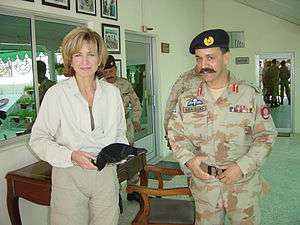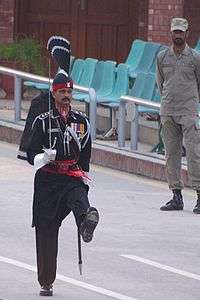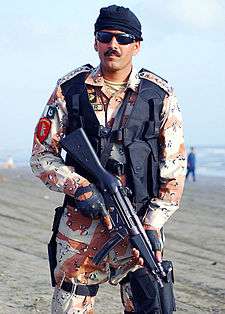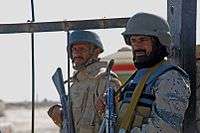Paramilitary forces of Pakistan
| Paramilitary Forces of Pakistan | |
|---|---|
 | |
| Service branches |
Pakistan National Guard |
| Headquarters | Islamabad, Lahore, Karachi, Quetta, Peshawar & Gilgit |
The federal paramilitary forces of Pakistan consist of various uniformed organisations largely equipped with light infantry weapons and charged with a range of internal and external duties. Their current strength is approximately over 420,000 personnel.[1]
The federal government's paramilitary forces can be divided into two categories: Firstly the Civil Armed Forces (CAF) -e.g. the Rangers and Frontier Corps- within the Interior Ministry; and those within the Ministry of Defence which include reserves and second line military armed forces (i.e. the Maritime Security Agency).
In addition provincial governments also control a number of specialised police forces, e.g. Counter-Terrorism Departments.
Strength

| Ministry | Organisation | Province | Total active duty personnel |
|---|---|---|---|
| Defence | Pakistan National Guard | All-Pakistan | 185,000[2] |
| Defence | Defence Service Guard | All-Pakistan | N/A |
| Defence | Maritime Security Agency | Balochistan & Sindh | 2,500[2] |
| Interior | Pakistan Rangers | Punjab & Sindh | 100,000[2] |
| Interior | Frontier Corps | Balochistan, KPK & FATA | 80,000 |
| Interior | Frontier Constabulary | Balochistan, KPK & FATA | 30,000 |
| Interior | Gilgit Baltistan Scouts | Gilgit-Baltistan | 2,481[2] |
| Interior | Pakistan Coast Guards | Balochistan & Sindh | 7,000[2] |
| Narcotics Control | Anti Narcotics Force | All-Pakistan | N/A |
| Aviation (Secretariat) | Airport Security Force | All-Pakistan | 8,930 |
Civil Armed Forces (CAF)
CAF units are authorised by the Constitution of Pakistan with border security and internal security duties, but can be "regularised" i.e. attached to regular Army as necessary.
The CAF are paid for from the budget of the Ministry of Interior which also provides administrative support. However they are (with the exception of the Frontier Constabulary) commanded by officers on secondment from the Pakistan Army. They function under the operational control of army corps headquarters, not just in war time but whenever Article 245 of the Pakistani Constitution is invoked to provide 'military aid to civil power', for example in Karachi since 2015, and in Punjab since February 2017 .
The CAF are currently undergoing significant expansion of some (57) additional 'wings' approved for raising in the 2015-16 to deal with the challenging internal and border security environment and to provide security for the China-Pakistan Economic Corridor (CPEC), co-ordinated by a new 2-star command raised in September 2016, the Special Security Division.[3]
Many CAF units were originally raised in the colonial era on the frontiers of the empire, and played a key role in the consolidation of control by building a link between the state and communities in strategically sensitive frontier areas through recruitment to government service. In many areas paramilitary units continue to play exactly the same historical role decades after independence.
- Pakistan Rangers: A generic phrase for two distinct organisations, the Punjab Rangers headquartered in Lahore and the Sindh Rangers in Karachi divided into battalion sized "wings" of approximately 800 men each. This force has a border security role on Punjab and Sindh provinces' the International Border with India, but also perform internal security duties (counter-insurgency, counter-gang, public order, etc.) under the operational control Pakistan Army corps commanders.[4]
- Frontier Corps: The Frontier Corps like the Rangers is a generic phrase for two distinct organisations, the FC KP and FC Balochistan. FC KP before the current round of expansion consisted of 15 corps in the Federally Administered Tribal Areas and the Province of Khyber Pakhtunkhwa with headquarters in Peshawar. FC Balochistan has 16 corps based in Balochistan with its HQ in Quetta. FC KP under the command of the Army's XI Corps has been in the forefront of COIN operations against the Tehrik-i-Taliban Pakistan and various foreign jihadis since 2003: FC Balochistan under XII Corps has been conducting similar operations against Baloch separatists in the same timeframe.
- Frontier Constabulary: The Frontier Constabulary operates along the internal border between the Federally Administered Tribal Areas (FATA) and KPK; unlike the Frontier Corps it is commanded by police officers.
- Gilgit Baltistan Scouts: Headquarters are in Gilgit. The Northern Light Infantry was converted in 1999 from a paramilitary force comparable to the Rangers and FC into one of the infantry regiments of the Pakistan Army in recognition of their performance and their heavy losses during the Kargil War in which they played a leading part on the ground. Subsequently, they have been replaced in the paramilitary 'Civil Armed Forces' role by the Scouts.
- Pakistan Coast Guards: The Coast Guards are charged and mandated with protecting the coastal areas of Balochistan and Sindh Province. It is largely a shore-based force with a particular focus on combatting smuggling. It is commanded by one-star rank brigadier and headquartered in Karachi, Sindh.
MoD Paramilitary Forces
- Pakistan National Guard: The National Guard comprises the Janbaz Force and locally recruited militia, the Mujahid Force, and are charged with air defence. Also included the dissolved National Cadet Corps and Women's Guard.
- Maritime Security Agency: The 2,500-strong Maritime Security Agency, headquartered in Karachi, is a coast guard and is responsible for patrolling Pakistan's territorial waters. The MSA is equipped with a former Pakistan Navy destroyer, two coastal patrol craft and four oceanic patrol craft. It too is seeing significant upgrades and expansion as a result of CPEC.
- Defence Service Guard: The DSG Corps provides static security to MoD and MoDP installations across Pakistan, including highly sensitive nuclear facilities. Its regimental centre is in Dera Ismail Khan. It was known from 1947 onwards as the MoD Constabulary until its renaming.
Other Federal Paramilitary Forces
- Anti-Narcotics Force: ANF is a principal agency in Pakistan for combating supply and demand reduction of illicit narcotic drugs that enter Pakistan mainly through the long porous border with Afghanistan. The agency works under umbrella of Pakistan Army and Ministry of Narcotics Control. It also carries out Raids and Intelligence Based Operations IBOs against Narcotics, Illegal Arms Ammunition, Money Laundering and dangerous/inflammable Chemicals.
- Airport Security Force: Safeguarding and protecting airports in Pakistan. Formerly part of the Ministry of Defence but later transferred to the Cabinet Secretariat Aviation Division[5]
Gallery
- Wahga Border
 Wagah border ceremony, 2015
Wagah border ceremony, 2015 A Pakistan Ranger (Punjab) at the Wagah border
A Pakistan Ranger (Punjab) at the Wagah border Pakistan Rangers (Punjab) marching
Pakistan Rangers (Punjab) marching A Pakistan Rangers (Sindh) commando on duty at the seashore in Karachi
A Pakistan Rangers (Sindh) commando on duty at the seashore in Karachi Frontier Corps Balochistan soldier (left) and the Afghan Border Police soldier (right) guards at the Durand Line's Friendship Gate, seven km southeast of Spin Boldak, Afghanistan.
Frontier Corps Balochistan soldier (left) and the Afghan Border Police soldier (right) guards at the Durand Line's Friendship Gate, seven km southeast of Spin Boldak, Afghanistan.
See also
References
- ↑ http://dawn.com/2013/03/25/pakistans-female-rangers-life-on-the-base/
- 1 2 3 4 5 Pakistan Intelligence, security Activities and Operations Handbook, Int'l Business Publications, 2011 Edition, pp. 131, ISBN 0-7397-1194-6
- ↑ Uploader (15 August 2016). "NAP decision: 29 new wings of civil armed forces to be raised".
- ↑ "Pakistan Rangers (Sindh)".
- ↑ "Videos - The Express Tribune". The Express Tribune.
External links
Pakistan Armed Forces comparative commissioned military ranks | ||||||||||||||
|---|---|---|---|---|---|---|---|---|---|---|---|---|---|---|
| Pay grade / Branch of Inter-service | O-1 | O-1 | O-2 | O-3 | O-4 | O-5 | O-6 | O-7 | O-8 | O-9 | O-10 (Obs.) | |||
| Approximate insignia[1][2] NATO equivalent |
||||||||||||||
| Air Force | P/Of. | F/Of. | Flt. Lt. | Sq-Ldr. | Wg-Cdr. | Gp-Capt. | Air-Cdre | AVM | AM | ACM | MAF[3] | |||
| Army | 2Lt | 1Lt | Cpt | Maj | Lt-Col | Col | Brig | Maj-Gen | Lt-Gen. | Gen | FM[2] | |||
| Navy | Mid | SLt. | Lt | Lt-Cdr | Cdr | Capt. | Cdre | R-Adm | V-Adm | Adm | FAdm[3] | |||
| Marines[4] | Mid | SLt. | Lt | Lt-Cdr | Cdr | Capt. | Cdre | R-Adm | V-Adm | No Equal | No Equal | |||
| [2] Grade authorized for use by Ayub Khan (for self-appointment) in 1962; since then it was never awarded [3] Grade never created or authorized [4] Not a separate branch, appointments directly from the Navy | ||||||||||||||
| BPS-13 | BPS-14 | BPS-15 | BPS-16 | |||||||||||
|---|---|---|---|---|---|---|---|---|---|---|---|---|---|---|
| Air Force | ||||||||||||||
| Army | Naib Subedar | Naib Subedar | Sbd | Sbd-Maj | ||||||||||
| Navy | CPO | FCPO | FCPO | MCPO | ||||||||||
| Marines | CPO | No Equal | No Equal | No Equal | ||||||||||
| [1] Grade depends on the service type authorized by the MoD | ||||||||||||||
Non-commissioned officer ranks | ||||||||||||||
|---|---|---|---|---|---|---|---|---|---|---|---|---|---|---|
| Inter-Service Pay Grade | BPS-7 | BPS-8 | BPS-9 | BPS-10 | BPS-11 | BPS-12 | BPS-12 | |||||||
| Air Force | No Equal | AC |
LAC |
SAC |
JTech |
Cpl. Tech |
STech |
No Equal | ||||||
| Army | Soldier | LNk |
Nk |
Hvld |
CQSgt |
Hvld-Maj |
QSgt |
Battal Sgt-Maj | ||||||
| Navy | No Equal | No Equal | OS-II | AB | No Equal | LH | PO | No Equal | ||||||
| Marines | No Equal | No Equal | No Equal | No Equal | No Equal | No Equal | PO | No Equal | ||||||
| [2] Grade depends on the service type authorized by the MoD | ||||||||||||||